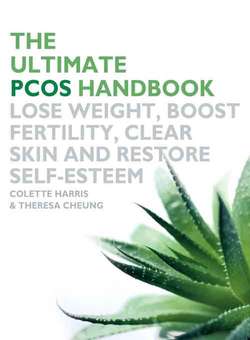Читать книгу The Ultimate PCOS Handbook: Lose weight, boost fertility, clear skin and restore self-esteem - Theresa Cheung - Страница 41
POSSIBLE SIDE-EFFECTS
ОглавлениеSome women who take oral contraceptives (not just those with PCOS) may notice amenorrhoea (lack of menstrual periods) or breakthrough bleeding (bleeding that occurs at the wrong time of the month). Often this breakthrough bleeding settles down after a few menstrual cycles, but if it happens your doctor may order an ultrasound scan of the uterus to check your endometrium (uterine lining).
If ultrasound shows that the endometrium is very thin, and if you don’t mind having no periods, your doctor may simply recommend continuing with oral contraceptives. If you prefer having menstrual periods, the type and dosage of contraceptives can be changed.
If the ultrasound shows that the endometrium is thick, your doctor will often prescribe a different type and dosage of oral contraceptives to trigger a period.
Many women worry that they will gain weight on the Pill. In the early days of the Pill this was a real problem; however, with the low-oestrogen pills now used, weight gain is very unusual. Nausea and bloating are potential side-effects, but these symptoms almost always go away after two or three months of taking the Pill.
Some women also say that the Pill increases their appetite. The British Medical Association’s Official Guide to Medicines and Drugs,1 does list weight gain as a possible side-effect. It goes on to say that ‘Oestrogen may also trigger the onset of diabetes mellitus in susceptible people, or aggravate blood sugar control in diabetic women.‘This isn’t usually a concern, but if you have PCOS you are at an increased risk of obesity and insulin resistance already, so you need to discuss this carefully with your doctor.
In addition, blood clots can occur, although this is a rare complication in healthy women. The risk of a healthy woman developing blood clots with the contraceptive pill is estimated at just 1 in 30,000.
While the Pill is thought to be very safe and effective, it’s important that we point out that it might lower your libido and can occasionally raise blood pressure, as well as cholesterol, blood sugar, and insulin levels.2 A preliminary study reported in the January 2006 Journal of Sexual Medicine claims that taking the contraceptive pill may lead to long-term loss of libido. A US–Canadian study3 has also found that even low-dose oral contraceptives appear to increase women’s risk of a heart attack or stroke. Dr John Nestler and Dr Paulina Essah of Virginia Commonwealth University, and Dr Jean-Patrice Baillargeon of the Université de Sherbrooke, analysed the results of several studies published between 1980 and 2002. They determined that women using low-dose contraceptives have approximately twice the risk of stroke or heart disease.
Women with polycystic ovary syndrome already have an increased risk of cardiovascular disease, Dr Nestler said, and are at an even greater risk if they are treated with low-dose contraceptives. He suggested that doctors consider alternatives. Long-term use of oral contraceptives may also increase this risk, Nestler said. But he said that for most women the risk is still very low.
This study reinforces why we emphasize the importance of natural approaches for treating PCOS, such as a healthy diet, regular exercise, stress management and selected nutritional supplements and herbs. Hormone contraception is effective in preventing pregnancy, but should be chosen with a full understanding of the health risks involved. Always consider alternatives including barrier methods (diaphragm, cervical cap, IUD, condoms), which have the added benefit of protecting you against sexually-transmitted diseases (STDs).
There are also health risks associated with being on the Pill if you’re overweight. Synthetic oestrogens in the Pill can increase the body’s drive towards insulin resistance, a precursor to diabetes. There’s also the increased risk of high blood pressure. So, for women with PCOS who have weight problems being on the Pill isn’t a good idea unless you’re following a healthy eating, healthy living plan and having regular check-ups for blood pressure, blood sugar and blood cholesterol levels.
Finally, it’s important to stress that the pill is not a miracle cure, because although it results in monthly menstrual periods, this doesn’t mean your PCOS is ‘cured’. But if it’s the right option for you, having a healthy lifestyle is the key.
Some studies4 also suggest that the Pill may actually leach valuable nutrients as well as alter your vitamin and mineral levels. Research indicates that the Pill lowers levels of B vitamins, folic acid, vitamin C and vitamin E. Levels of vitamin A and iron may also increase, as do levels of copper – which isn’t a good thing because copper levels that are higher than normal can increase the risk of high blood pressure. Zinc is perhaps the most important mineral that can be affected by the Pill. The Pill is thought to change a woman’s capacity to absorb zinc, and you need sufficient levels of zinc to maintain a healthy reproductive system and hormonal balance.
If you’re on the Pill, on top of your healthy diet (which we’ll outline in Part 2) it might be a good idea to supplement extra vitamin B complex to help your liver break down synthetic hormones effectively. You might also consider taking a zinc supplement.
We also know that the Pill can lower levels of good cholesterol (HDL) and increase levels of bad cholesterol (LDL), so you need to eat foods that promote good cholesterol to reduce your risk of heart disease. The Pill can also kill off friendly bacteria in your gut, which can lead to digestive problems. Live yoghurt which contains natural probiotics should be on your daily menu. If you’re dairy intolerant, you can buy fruit-based drinks with live bacterial cultures from health food stores.
